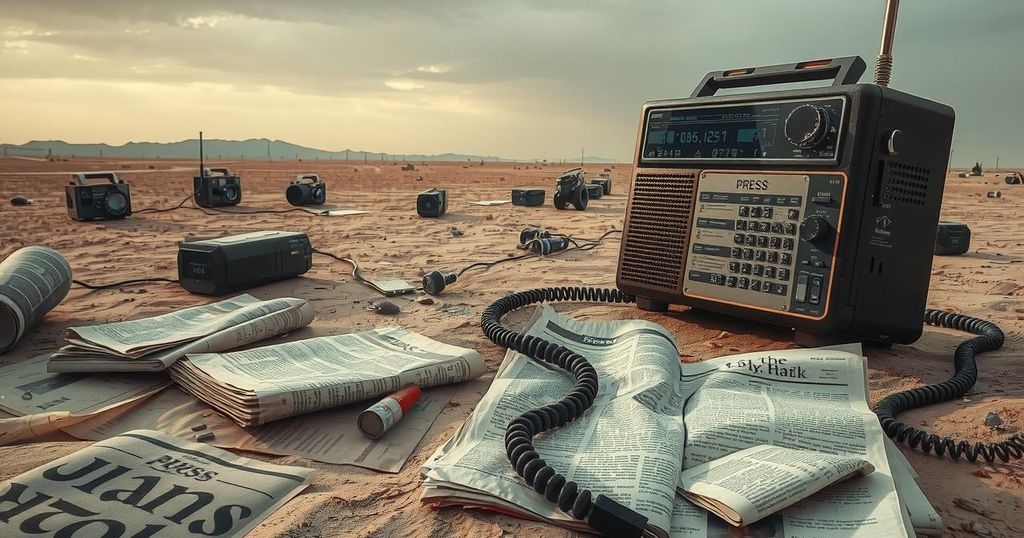Press Freedom Under Siege: The Struggles of Journalists in the DRC

In the Democratic Republic of Congo, journalists face grave threats to their safety and press freedom amid ongoing conflict involving the M23 rebel group. Following a radio discussion on media harassment, journalist Philip Mayifilua was accused of supporting the M23 and fled to Uganda for safety. The government and rebel forces both impose severe limitations on press activity, prompting self-censorship among media professionals. Efforts are underway to support journalists through cross-border initiatives, emphasizing the necessity of independent reporting.
Journalist Philip Mayifilua confronted serious press freedom challenges in the Democratic Republic of Congo (DRC) after discussing media harassment on a radio show. Following his broadcast, the Higher Council for Audiovisual and Communication accused him of supporting the Tutsi-led March 23 Movement (M23) and threatened his arrest. Fearing for his safety, Mayifilua fled to Uganda, highlighting the ongoing danger faced by journalists in the DRC.
Mayifilua’s plight arose amidst escalating violence after the M23’s takeover of Goma, which has led to significant casualties and displacements since January. Congolese journalists have found themselves increasingly vulnerable to threats, arrests, and the need to flee the country, with over 40 reported cases of journalists seeking refuge elsewhere.
Both the DRC government and the M23 rebels have threatened media freedoms. The government restricts coverage of the M23, while rebels intimidate journalists who report favorably on government actions. Some media outlets have ceased operations entirely, and even Al Jazeera faced a suspension. Journalists are often subjected to physical dangers, and their workplaces have been looted.
Freelance journalist Dame Tuluka experienced threats firsthand when she attempted to leave the DRC via Rwanda. She was detained by customs agents who accused her of espionage, leaving her traumatized and fearful of further repercussions.
Increasingly, journalists in DRC self-censor by avoiding sensitive topics, including military abuses, to protect themselves. This has led to significant financial strain, as many have not worked since the conflict intensified, resulting in hardships supporting their families.
Gilbert Bukeyeneza, founder of the Ukweli Coalition, emphasizes the dual challenges facing journalists due to both government and rebel pressures to conform to specific narratives. He advocates for the safety of journalists and acknowledges the potential of cross-border reporting collaborations in East Africa to support their efforts.
Despite risks, Mayifilua and Tuluka remain dedicated to advocating for a free press, undeterred by the dangers they face. They exemplify the resilience and commitment needed for impactful journalism in a hostile environment.
In summary, the safety and independence of journalists in the DRC are severely compromised by ongoing violence and political pressures. Organizations like the Ukweli Coalition are attempting to provide support, promoting collaboration and safety among journalists facing these dire circumstances. The tireless efforts of individuals like Mayifilua and Tuluka showcase the vital role journalism plays in advocating for truth and accountability, despite the significant risks involved.
The plight of journalists in the Democratic Republic of Congo highlights the dire circumstances surrounding press freedom in a conflict-ridden landscape. Facing threats from both governmental and rebel entities, many journalists are compelled to self-censor, resulting in financial distress and emotional trauma. Initiatives dedicated to supporting their safety and promoting cross-border collaborations are crucial for safeguarding independent media. The resolve of journalists like Philip Mayifilua and Dame Tuluka underscores the ongoing struggle for press freedom in the DRC, emphasizing the importance of their work in advocating for truth amidst adversity.
Original Source: ijnet.org







